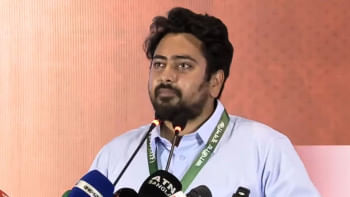CHT Peace Talks: Chips are Down
Peace prospects for our hills which add a refreshing contour to our plainland topography seem tantalisingly close yet afar. The fifth round of negotiations for striking a peace deal between the National Committee on CHT affairs and the Parbattya Chattagram Jana Sanghati Samity is headed for ending on an inconclusive note. The much-touted outcome of the previous round of talks that a 'consensus' has been reached on 'all points' of discord and all that was left to be done was to put signatures on a draft accord has been somewhat belied. Perhaps, there was a signal for it in the smile that PCJSS leader Bodhipriya Larma wore in an apparently nodding gesture to what national committee chief Abul Hasnat Abdullah had to say by way announcing the auspicious breakthrough to the press. The stream of geniality on his face obviously fell short of a clear-cut public affirmation by Larma that he really was going along with the views of Abdullah. The agenda for the fifth round sounded complicated with new moot points thrown in and fresh conditions attached to the signing of a deal by the PCJSS which has turned out to be indistinguishable from the Shantibahini. Constitutional guarantees have been sought for the regional council and the district councils with total authority vested in terms of levying taxes and administering law and order.
Proportionate representation of Bengali settlers on such councils was previously spurned by the tribal leadership and lately in a reformed package submitted to Bangladeshi negotiator they have even rejected the idea that settlers could be elected vice-chairmen to these bodies. It is surmised by some people that PCJSS may well have decided not to sign a peace deal before the several cases lying with the High Court relating to the legal tenability of government nominated temporary hill district councils are disposed of. Also BNP leader of Khagrachhari Abdul Wadud Bhuiyan has challenged the reservation of the post of district council chairman for the tribals in the High Court. The progress on this case is also being closely watched by the tribal community, as reported in a leading Bangla daily. The government has gone further than merely allowing the tribals to become chairmen of the hill district councils; it has, as a matter of fact, even agreed to reserve the chairmanship of the Regional Council for a tribal.
The peace deal has been apparently made contingent upon the satisfaction of the tribal refugee leadership camped in Tripura over the rehabilitation of refugees recently repatriated to Bangladesh. A refugee leaders' delegation from Tripura of late went back after a trip to the CHT camps and made some adverse comments on how the Bangladesh authorities were looking after the tribal returnees. They sent copies of their observations to foreign missions and international organisations seeking their help in having the rehabilitation process in the CHT supervised by the UNHCR or ICRC. There had been an earlier discordant instance of some tribal leaders attending an international ethnic relations conference in Bangkok much to the dismay of Bangladeshi negotiators in Dhaka. The dissenters of the hill students front are rallying round a new stratagem for internationalising the tribal question in a bid to deflect the bilateral peace process off course. But could they have spearheaded the move without an encouragement from some senior leaders of the extremist mould within the Shantibahini? Incidentally, a pahari student faction reportedly has linked up with an Arakan communist group in Myanmar.
The government has ruled out any involvement of UNHCR with refugee rehabilitation process in Bangladesh on the ground that the UN body hasn't been overseeing the conditions of refugees at the source in the Indian camps anyway, the government of that neighbouring country having refused them access. But a stronger argument against this move would be for Bangladesh government to plainly say that its proven bonafides on refugee rehabilitation has been unnecessarily questioned for purely tactical reasons by those who do not wish olive branch to spread across the CHT. The fifth round of peace talks has seen the scaling down of the agenda from 'signing' to 'discussing' the draft accord. And at the end of it what we see is a referral syndrome on the part of the PCJSS in its open wish to have the draft accord deliberated upon and vetted by its various affiliated groups. There are two ways of looking at this development: one, the routing of the draft accord through the conduit of the militants could ensure its implementation on adoption; and two, the process of reaching an agreement might, on the other hand, procrastinate ad infinitum. Our hope is the first possibility will be realised and the world would know that the writ of PCJSS extends over the various constituent groups of the Shantibahini.

 For all latest news, follow The Daily Star's Google News channel.
For all latest news, follow The Daily Star's Google News channel. 



Comments